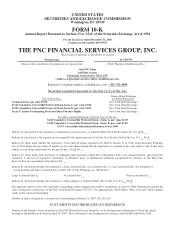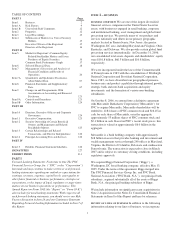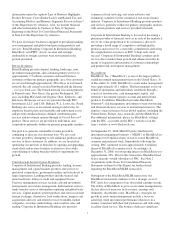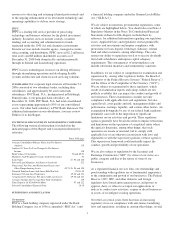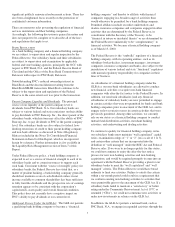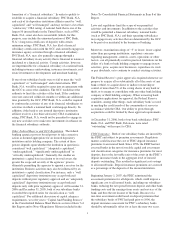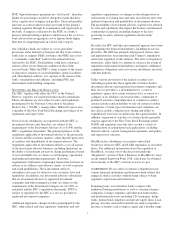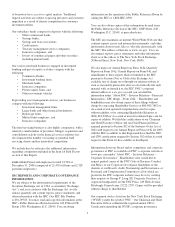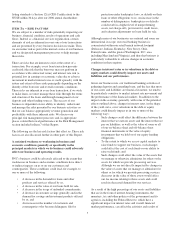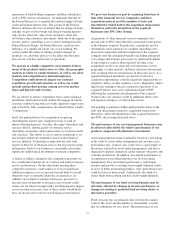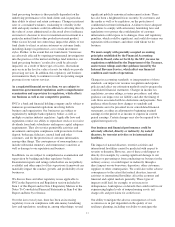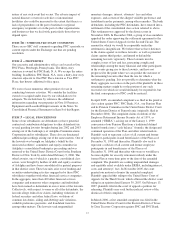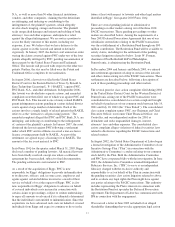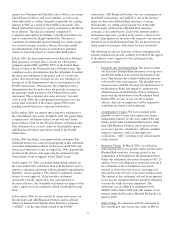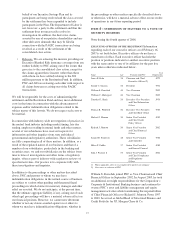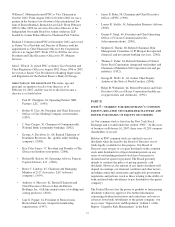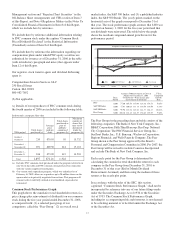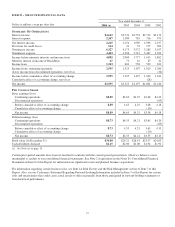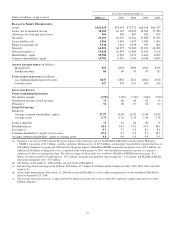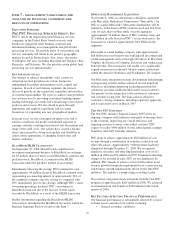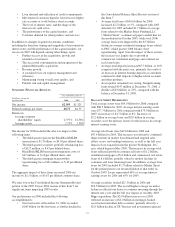PNC Bank 2006 Annual Report Download - page 21
Download and view the complete annual report
Please find page 21 of the 2006 PNC Bank annual report below. You can navigate through the pages in the report by either clicking on the pages listed below, or by using the keyword search tool below to find specific information within the annual report.fund processing business is thus partially dependent on the
underlying performance of its fund clients and, in particular,
their ability to attract and retain customers. Changes in interest
rates or a sustained weakness, weakening or volatility in the
debt and equity markets could (in addition to affecting directly
the value of assets administered as discussed above) influence
an investor’s decision to invest or maintain an investment in a
particular mutual fund or other pooled investment product.
Other factors beyond our control may impact the ability of our
fund clients to attract or retain customers or customer funds,
including changes in preferences as to certain investment
styles. Further, to the extent that our fund clients’ businesses
are adversely affected by ongoing governmental investigations
into the practices of the mutual and hedge fund industries, our
fund processing business’ results also could be adversely
impacted. As a result of these types of factors, fluctuations
may occur in the level or value of assets for which we provide
processing services. In addition, this regulatory and business
environment is likely to continue to result in operating margin
pressure for our various services.
As a regulated financial services firm, we are subject to
numerous governmental regulations and to comprehensive
examination and supervision by regulators, which affects
our business as well as our competitive position.
PNC is a bank and financial holding company and is subject to
numerous governmental regulations involving both its
business and organization. Our businesses are subject to
regulation by multiple bank regulatory bodies as well as
multiple securities industry regulators. Applicable laws and
regulations restrict our ability to repurchase stock or to receive
dividends from bank subsidiaries and impose capital adequacy
requirements. They also restrict permissible activities and
investments and require compliance with protections for loan,
deposit, brokerage, fiduciary, mutual fund and other
customers, and for the protection of customer information,
among other things. The consequences of noncompliance can
include substantial monetary and nonmonetary sanctions as
well as damage to our reputation and business.
In addition, we are subject to comprehensive examination and
supervision by banking and other regulatory bodies.
Examination reports and ratings (which often are not publicly
available) and other aspects of this supervisory framework can
materially impact the conduct, growth, and profitability of our
businesses.
We discuss these and other regulatory issues applicable to
PNC in the Supervision and Regulation section included in
Item 1 of this Report and in Note 4 Regulatory Matters in the
Notes To Consolidated Financial Statements in Item 8 of this
Report and here by reference.
Over the last several years, there has been an increasing
regulatory focus on compliance with anti-money laundering
laws and regulations, resulting in, among other things, several
significant publicly-announced enforcement actions. There
has also been a heightened focus recently, by customers and
the media as well as by regulators, on the protection of
confidential customer information. A failure to have adequate
procedures to comply with anti-money laundering laws and
regulations or to protect the confidentiality of customer
information could expose us to damages, fines and regulatory
penalties, which could be significant, and could also injure our
reputation with customers and others with whom we do
business.
We must comply with generally accepted accounting
principles established by the Financial Accounting
Standards Board, rules set forth by the SEC, income tax
regulations established by the Department of the Treasury,
and revenue rulings and other guidance issued by the
Internal Revenue Service, which affect our financial
condition and results of operations.
Changes in accounting standards, or interpretations of those
standards, can impact our revenue recognition and expense
policies and affect our estimation methods used to prepare the
consolidated financial statements. Changes in income tax
regulations, revenue rulings, revenue procedures, and other
guidance can impact our tax liability and alter the timing of
cash flows associated with tax deductions and payments. New
guidance often dictates how changes to standards and
regulations are to be presented in our consolidated financial
statements, as either an adjustment to beginning retained
earnings for the period or as income or expense in current
period earnings. Certain changes may also be required to be
applied retrospectively.
Our business and financial performance could be
adversely affected, directly or indirectly, by natural
disasters, by terrorist activities or by international
hostilities.
The impact of natural disasters, terrorist activities and
international hostilities cannot be predicted with respect to
severity or duration. However, any of these could impact us
directly (for example, by causing significant damage to our
facilities or preventing us from conducting our business in the
ordinary course), or could impact us indirectly through a
direct impact on our borrowers, depositors, other customers,
suppliers or other counterparties. We could also suffer adverse
consequences to the extent that natural disasters, terrorist
activities or international hostilities affect the economy and
financial and capital markets generally. These types of
impacts could lead, for example, to an increase in
delinquencies, bankruptcies or defaults that could result in our
experiencing higher levels of nonperforming assets, net
charge-offs and provisions for credit losses.
Our ability to mitigate the adverse consequences of such
occurrences is in part dependent on the quality of our
resiliency planning, including our ability to anticipate the
11


